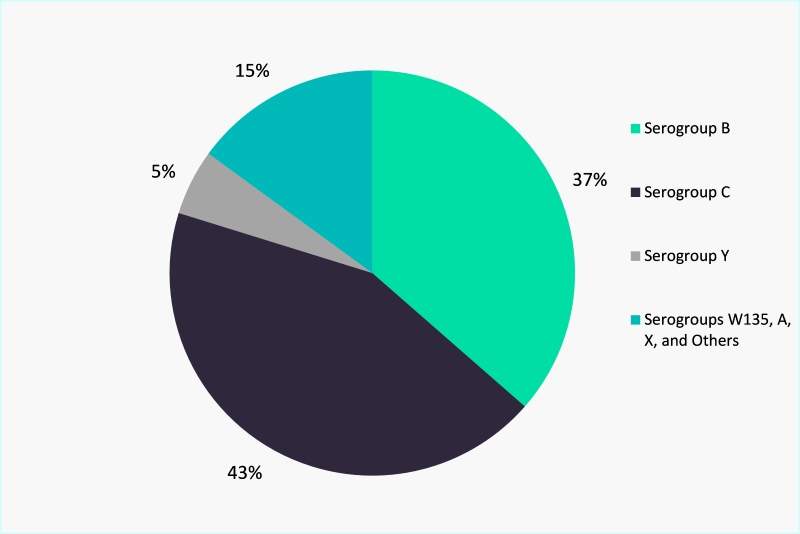
Invasive meningococcal disease (IMD) is a condition that is often severe and can be deadly (CDC, 2017). IMD is caused by the bacteria N. meningitides, which is exclusive to humans. The bacteria are found in the upper airways of approximately 5–11% of adults and up to 25% of adolescents (Loving and Pollard, 2016). Life-threatening disease occurs when the bacterium invades the blood stream or tissue between the brain and skull and manifests as meningitis and septicemia. IMD causes significant illness and death in children and young adults worldwide. Understanding trends in IMD serogroup characteristics will be important for both disease prevention and vaccination programs.
IMD has at least 13 different subtypes. However, six of these subgroups account for most of the disease cases worldwide: serogroups A, B, C, W135, X, and Y. The distribution of serogroups varies globally. GlobalData epidemiologists forecast that in 2015, the majority of new cases of IMD in the eight major markets (8MM: US, France, Germany, Italy, Spain, UK, Japan and Brazil) were expected to occur as serogroup C IMD; however, by 2025, the majority of cases will occur as serogroup B IMD. This change will largely be driven by a substantial decline in the number of laboratory-confirmed incident cases of serogroup C IMD in Brazil, which comes as a result of the serogroup C vaccination in Brazil (Figure 1 and Figure 2).

Discover B2B Marketing That Performs
Combine business intelligence and editorial excellence to reach engaged professionals across 36 leading media platforms.
Figure 1: 8MM, Laboratory Confirmed Incident Cases of IMD, Both Sexes, All Ages, 2015

Source: GlobalData. 5EU= France, Germany, Italy, Spain, UK; 8MM= US, 5EU, Japan, and Brazil
GlobalData epidemiologists forecast a decrease in the laboratory-confirmed incident cases of IMD in the 8MM over the next 10 years, from 4,153 cases in 2015 to 2,169 cases in 2025, at a negative Annual Growth Rate (AGR) of 2.37%. Individually, a decline is also forecast in Spain, the UK, Japan and Brazil. Over the past decade, a substantial decline in the number of laboratory-confirmed new cases of IMD has occurred in almost all 8MM. This has largely been driven by the introduction of nationwide vaccination programs (Ali et al., 2014). In the US, France, Germany and Italy, GlobalData epidemiologists forecast an increase in the laboratory-confirmed incident cases of IMD, which will be driven by a combination of changes in the laboratory-confirmed incidence of serogroup-specific IMD and changes in population demographics.

US Tariffs are shifting - will you react or anticipate?
Don’t let policy changes catch you off guard. Stay proactive with real-time data and expert analysis.
By GlobalDataThese figures show GlobalData’s analysis of historical trends in serotype distributions in the 8MM and the projected changes estimated in the IMD patient population for 2025. Figure 1 and Figure 2 compare the 2015 serotype distribution with the 2025 serotype distribution.
Serotype B IMD will contribute a larger proportion of new IMD cases in 2025 than in 2015. Presently, the UK is the first country to implement a national serogroup B vaccination program. If other countries carry out a similar program to that of the UK, this will more than likely reduce the number of laboratory confirmed cases of IMD. The changing serotypes of IMD highlight the important role vaccination plays in reducing the risk of death and illness in children and young adults. Further discussions of IMD epidemiology and global drug forecast can be found in the GlobalData reports, EpiCast Report: Meningococcal Disease – Epidemiology Forecast to 2025 and PharmaPoint: Meningococcal Vaccines– Global Drug Forecast and Market Analysis to 2025.
Figures 1 and 2 highlight the changing serotype proportions associated with IMD in the 8MM in 2015 and 2025.
Figure 2: 8MM, Laboratory-confirmed Incidence Cases of IMD, Both Sexes, All Ages, 2025

Source: GlobalData. 5EU= France, Germany, Italy, Spain, UK; 8MM= US, 5EU, Japan, and Brazil





